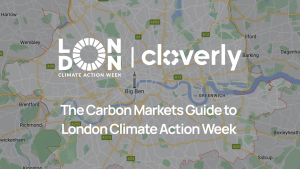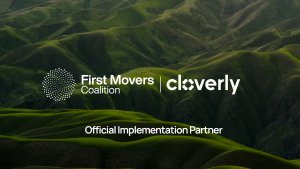As we reflect on 2023, it’s evident that the voluntary carbon market (VCM) has traversed a path of both challenges and significant advancements. Dynamic shifts in carbon credit prices and trade volumes, along with a heightened focus on quality and integrity, indicate a maturing market. These developments also reflect market adaption to the complex need for expanded global climate action. As a case in point, MSCI reported that December 2023 saw the largest ever volume of voluntary carbon credits retired (36 million metric tons). Within this rapidly evolving landscape, Cloverly has continued to empower organizations with the tools and knowledge they need to take effective climate action. In this special feature, we present a curated collection of our most impactful blogs, resources, and webinars from 2023. These insights reflect Cloverly’s unwavering commitment to educate, inspire, and facilitate practical climate impact. Let’s dive into the topics that have resonated most with our audience.i
Contact Cloverly today to learn how we can help you incorporate effective climate action into your net zero strategies.
Top 5 Voluntary Carbon Market blogs
1. Are Carbon Credits Tax Deductible? A Brief Guide to Carbon Credits and Taxes: Explore the intricacies of carbon credit tax deductibility across various regions, including the USA, UK, and Australia. Understand the tax implications for both buyers and developers of carbon credits and learn about sales tax considerations and disclosure requirements.
2. Carbon Removal in the Voluntary Carbon Market: Scaling Climate Action: Discover the role the VCM is playing in scaling carbon removal, the significance of carbon removal credits, and how they contribute to achieving net-zero goals. Delve into the latest trends, challenges, and opportunities and what businesses need to know to get started with carbon removal credits.
3. EU Regulation Vs. Greenwashing: Deciphering the EU Green Claims Directive: Navigate the complexities of the EU Green Claims Directive, a regulation that aims to combat greenwashing. Understand how the directive mandates accurate, verifiable information on product and service impacts, how businesses can comply, and the role that carbon credits can play in authentic environmental claims.
4. Selling Carbon Credits Just Got Easier with Cloverly Catalyst: See how Cloverly Catalyst is addressing a critical market need for efficient, trusted transaction pathways between buyers and sellers. Catalyst is a groundbreaking platform that simplifies carbon credit inventory management and enables omni-channel distribution for carbon credit suppliers. By unlocking effective carbon credit operations and transparent transactions, Catalyst enables both suppliers and buyers to shift their focus to what matters most – scaling their impact.
5. What Is Article 6 Of the Paris Agreement, And What Does It Mean for Carbon Credit Buyers? Learn how this key provision shapes the international trade of carbon credits, influencing the VCM and corporate buying strategies. Understand the implications for carbon credit quality, corresponding adjustments, and how to build an Article 6 compliant carbon credit portfolio.
Top 5 Voluntary Carbon Market resources
1. Beginner’s Guide to Carbon Credits: Delve into essential insights about what carbon credits are, how they work, and how to effectively use them in your sustainability strategy. Learn about the various types of carbon credits, the nuances of evaluating carbon credit quality, and how to make the most impact with your carbon credit budget.
2. 7 Benefits of Carbon Credits: How to Make the Business Case to the C-Suite: See how investing in the right carbon credits yields compelling advantages beyond positive environmental impact. Understand how carbon credits can align with regulatory compliance, ESG targets, and operational efficiency, while also fostering stakeholder engagement and innovation. Get practical steps and insights for integrating them into corporate sustainability strategies.
3. Ultimate Guide to Building a Carbon Credit Portfolio: A diversified, balanced carbon credit portfolio is key to mitigating market risks. Explore strategies for portfolio diversification, and learn how to build a carbon credit portfolio with the right balance between quality, cost, and impact.
4. Playbook for Decarbonizing Portfolio Companies: Discover how private equity firms can establish and manage successful sustainability programs with their portfolio companies. Find out why environmental sustainability is important for portfolio companies, including drivers such as regulatory pressures, investor demands, and the benefits of decarbonization. Investigate best practices and tips for long-term success.
5. Checklist: 6 Steps for Building the Business Case for Carbon Credits: A holistic sustainability strategy that includes carbon credits can mitigate risk and create new opportunities. Get the essential steps for building the business case and developing a successful strategy.
Top 5 Voluntary Carbon Market webinars
1. COP28 Unpacked: The Future of Voluntary Carbon Markets: Explore crucial insights into the role of the Voluntary Carbon Market (VCM) post-COP28. Our CEO and other leaders who attended COP28 share an in-depth analysis of key COP28 outcomes, future trends, and strategic guidance for businesses on how to navigate the evolving VCM.
2. Managing Carbon Credit Quality and Risk in the Voluntary Carbon Markets: Experts from Cloverly, BeZero Carbon, Isometric, and Oka discuss evolving risk and quality standards in the VCM. The webinar addresses key strategies for de-risking carbon credit purchases and integrating them into net zero strategies. Learn best practices for ensuring that carbon credits align with business goals, climate targets, and risk tolerance, while achieving the intended impact.
3. Making the Business (and Climate) Case for Carbon Credits: Find out how carbon credits can boost supply chain decarbonization, while adding value to your bottom line. Discover why the VCM is critical for achieving both global climate goals and corporate net zero targets, as well as the business advantages of carbon credits. Rand Ekman, Chief Sustainability Officer at HKS Inc., also shares his story of how he successfully implemented a carbon offsetting strategy across his firm.
4. Impactful Climate Action for Financial Institutions with Visa & Ecolytiq: Thought leaders from Cloverly, Visa, and ecolytiq unpack the current and future landscape of climate action for financial institutions. Unravel the unique challenges and opportunities for climate action in the financial sector, compelling use cases, and practical strategies for getting started.
5. Decarbonizing Portfolio Companies to Drive Change with AEA & Optera: Experts from Cloverly, AEA Investors, and Optera discuss how investors and private equity firms can drive climate action through portfolio decarbonization. Key topics covered include market and financed emission trends, the importance of Scope 3 emissions, how to engage portfolio companies in climate action, and real-world success stories.
Reflecting on a pivotal year for the Voluntary Carbon Market
2023 marked a watershed moment in the evolution of the VCM, with a shift toward quality, transparency, and broader environmental and social objectives. This year’s key developments in the market reflect a more discerning, holistic approach to carbon offsetting, integral for effective climate action and achieving global climate targets. Join us as we look to turn the insights of 2023 into impactful climate action for a more sustainable 2024.
Talk to Cloverly today to build a high-quality carbon credit portfolio aligned with your ESG goals that will also contribute to global climate goals.
i Based on Google Analytics page views.
About the author:
Julie Yamamoto is the Senior Content Manager at Cloverly. She has over 20 years of global experience spanning multiple sectors. Her work has been featured in several enterprise and nonprofit digital channels, as well as Forbes, TechTarget, GreenBiz, and American Forests. In previous roles, she led content marketing for the OneTrust ESG & Sustainability Cloud and the IBM Center for Applied Insights. She is also a trained Climate Reality leader and has led sustainability initiatives such as IBM AI for Social Good (Environment), Watson Green Advisor, Forests for the Earth, and conservation data science.





